-
 Bitcoin
Bitcoin $113900
-1.39% -
 Ethereum
Ethereum $3517
-4.15% -
 XRP
XRP $3.009
1.59% -
 Tether USDt
Tether USDt $0.9997
-0.04% -
 BNB
BNB $766.8
-1.41% -
 Solana
Solana $164.6
-2.38% -
 USDC
USDC $0.9998
-0.02% -
 TRON
TRON $0.3277
0.65% -
 Dogecoin
Dogecoin $0.2023
-1.67% -
 Cardano
Cardano $0.7246
0.05% -
 Hyperliquid
Hyperliquid $38.27
-4.77% -
 Sui
Sui $3.528
-0.52% -
 Stellar
Stellar $0.3890
-0.73% -
 Chainlink
Chainlink $16.16
-2.69% -
 Bitcoin Cash
Bitcoin Cash $539.9
-4.38% -
 Hedera
Hedera $0.2425
-2.00% -
 Avalanche
Avalanche $21.71
-0.97% -
 Toncoin
Toncoin $3.662
5.73% -
 Ethena USDe
Ethena USDe $1.000
-0.02% -
 UNUS SED LEO
UNUS SED LEO $8.964
0.35% -
 Litecoin
Litecoin $107.7
2.33% -
 Shiba Inu
Shiba Inu $0.00001223
-0.40% -
 Polkadot
Polkadot $3.617
-0.97% -
 Uniswap
Uniswap $9.052
-2.49% -
 Monero
Monero $295.1
-3.79% -
 Dai
Dai $0.9999
0.00% -
 Bitget Token
Bitget Token $4.315
-1.85% -
 Pepe
Pepe $0.00001060
0.11% -
 Cronos
Cronos $0.1342
-2.72% -
 Aave
Aave $256.0
-0.87%
How to add tokens in Rabby Wallet? Detailed explanation of custom token addition methods
Adding custom tokens to Rabby Wallet involves entering the token's contract address, symbol, and decimals, then verifying and confirming the addition in your portfolio.
May 18, 2025 at 10:07 pm
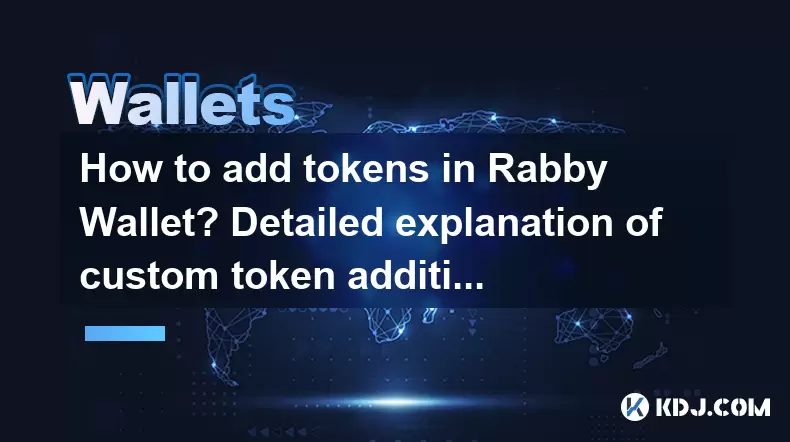
Adding custom tokens to your Rabby Wallet can be a straightforward process if you follow the correct steps. This guide will walk you through the detailed methods of adding tokens to your Rabby Wallet, ensuring you can manage your cryptocurrency portfolio effectively.
Understanding Rabby Wallet and Custom Tokens
Rabby Wallet is a versatile cryptocurrency wallet that supports a wide range of tokens on various blockchains. Custom tokens are those that are not listed by default in the wallet but can be added manually. These tokens might be new, less popular, or specific to certain decentralized applications (DApps).
To add a custom token, you will need to know the token's contract address, its symbol, and the number of decimals it uses. This information is usually provided by the token's creators or can be found on blockchain explorers like Etherscan.
Step-by-Step Guide to Adding Custom Tokens in Rabby Wallet
To add a custom token to your Rabby Wallet, follow these detailed steps:
Open Rabby Wallet: Launch the Rabby Wallet application on your device. Ensure you are logged into your account.
Navigate to the Portfolio Section: Once inside the wallet, go to the Portfolio section where your assets are displayed.
Select the Network: Choose the blockchain network on which the token you want to add is based. For example, if you are adding an ERC-20 token, select the Ethereum network.
Access the Add Token Option: Look for an option to add a new token. This is usually represented by a button labeled Add Token or Custom Token.
Enter Token Details: A form will appear where you need to input the following details:
- Contract Address: This is the unique address of the token on the blockchain. It is crucial to enter this correctly.
- Token Symbol: This is the short name or symbol used to represent the token, like "BTC" for Bitcoin.
- Decimals: This indicates how many decimal places the token uses. For example, most ERC-20 tokens use 18 decimals.
Verify and Add: After entering the details, the wallet will verify the token information. If everything is correct, you will see a confirmation screen. Click on Add Token to finalize the process.
Check Your Portfolio: Once added, the new token should appear in your portfolio, allowing you to view your balance and perform transactions with it.
Troubleshooting Common Issues
Sometimes, users may encounter issues when adding custom tokens. Here are some common problems and their solutions:
Incorrect Contract Address: If the token does not appear after adding, double-check the contract address for any typos or errors. A single incorrect character can lead to failure.
Network Mismatch: Ensure you have selected the correct blockchain network for the token. Adding an ERC-20 token on the BSC network, for example, will not work.
Token Not Recognized: If the token is very new or not widely used, it might take some time for the wallet to recognize it. In such cases, waiting a few minutes and trying again can help.
Adding Tokens on Different Blockchains
Rabby Wallet supports multiple blockchains, and the process of adding tokens can vary slightly depending on the network. Here's how to add tokens on some popular blockchains:
Ethereum (ERC-20 Tokens):
- Follow the steps mentioned above, ensuring you select the Ethereum network and enter the correct ERC-20 token details.
Binance Smart Chain (BEP-20 Tokens):
- Select the BSC network in Rabby Wallet. The process remains the same, but ensure you enter the BEP-20 token's contract address, symbol, and decimals.
Polygon (MATIC Tokens):
- Choose the Polygon network. Add the token by entering its contract address, symbol, and decimals as you would with other networks.
Managing Your Custom Tokens
Once you have added custom tokens to your Rabby Wallet, you can manage them just like any other asset. Here are some tips for managing your custom tokens effectively:
Regularly Update Token Information: If a token undergoes updates or changes, you might need to update its details in your wallet. Check the token's official channels for any updates.
Monitor Token Activity: Keep an eye on the activity of your custom tokens. If a token becomes inactive or is no longer supported, consider removing it from your wallet to keep your portfolio clean.
Backup Your Wallet: Always ensure you have a backup of your wallet. This is crucial, especially when dealing with custom tokens, as they might not be as widely supported as mainstream cryptocurrencies.
Security Considerations When Adding Custom Tokens
Adding custom tokens can introduce security risks if not done carefully. Here are some security tips to keep in mind:
Verify Token Information: Always verify the token's contract address, symbol, and decimals from trusted sources like the official token website or reputable blockchain explorers.
Be Wary of Phishing: Scammers might try to trick you into adding fake tokens. Always double-check the source of the token information.
Use Strong Passwords and 2FA: Ensure your Rabby Wallet account is protected with a strong password and two-factor authentication (2FA) to prevent unauthorized access.
Frequently Asked Questions
Q1: Can I add tokens from any blockchain to Rabby Wallet?
A1: Rabby Wallet supports multiple blockchains, but not all blockchains may be supported. Before adding a token, ensure that the blockchain it is based on is supported by Rabby Wallet. You can check the wallet's documentation or support section for a list of supported networks.
Q2: What should I do if a token I added disappears from my wallet?
A2: If a token disappears from your wallet, first check if the token's contract address was entered correctly. If it was, the token might have been delisted or the network might be experiencing issues. You can try re-adding the token or contact Rabby Wallet support for assistance.
Q3: Is it possible to add tokens without knowing their contract address?
A3: No, you must know the token's contract address to add it to Rabby Wallet. The contract address is essential for the wallet to interact with the token on the blockchain.
Q4: Can I add tokens that are not yet listed on any exchange?
A4: Yes, you can add tokens that are not listed on any exchange as long as you have their contract address, symbol, and decimals. However, be cautious when dealing with unlisted tokens, as they may carry higher risks.
Disclaimer:info@kdj.com
The information provided is not trading advice. kdj.com does not assume any responsibility for any investments made based on the information provided in this article. Cryptocurrencies are highly volatile and it is highly recommended that you invest with caution after thorough research!
If you believe that the content used on this website infringes your copyright, please contact us immediately (info@kdj.com) and we will delete it promptly.
- Bitcoin Strategy: Saylor's Not Hoarding, He's Building an Empire
- 2025-08-02 22:30:12
- Bitcoin Bloodbath: Macro Pressures and Liquidations Unleash Crypto Chaos
- 2025-08-02 22:30:12
- Worldcoin, Identity, WLD Price: Decoding the NYC Crypto Buzz
- 2025-08-02 21:10:12
- Shiba Inu: Utility and Community Strength Drive Crypto's Evolution
- 2025-08-02 21:50:12
- Crypto Donations, Trump PAC, and Bitcoin: A New York Minute on Political Coin
- 2025-08-02 20:30:12
- Crypto Market Under Pressure: Bearish Momentum and Rising Volatility Take Hold
- 2025-08-02 20:30:12
Related knowledge

What is a watch-only wallet in Trust Wallet?
Aug 02,2025 at 03:36am
Understanding the Concept of a Watch-Only WalletA watch-only wallet in Trust Wallet allows users to monitor a cryptocurrency address without having ac...

How to switch between networks in Trust Wallet?
Aug 02,2025 at 12:36pm
Understanding Network Switching in Trust WalletSwitching between networks in Trust Wallet allows users to manage assets across different blockchains s...
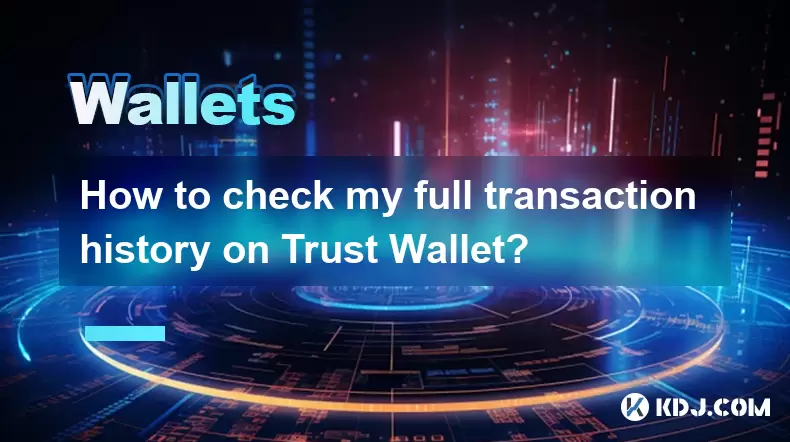
How to check my full transaction history on Trust Wallet?
Aug 02,2025 at 09:24am
Understanding Transaction History in Trust WalletTrust Wallet is a widely used non-custodial cryptocurrency wallet that supports a broad range of bloc...
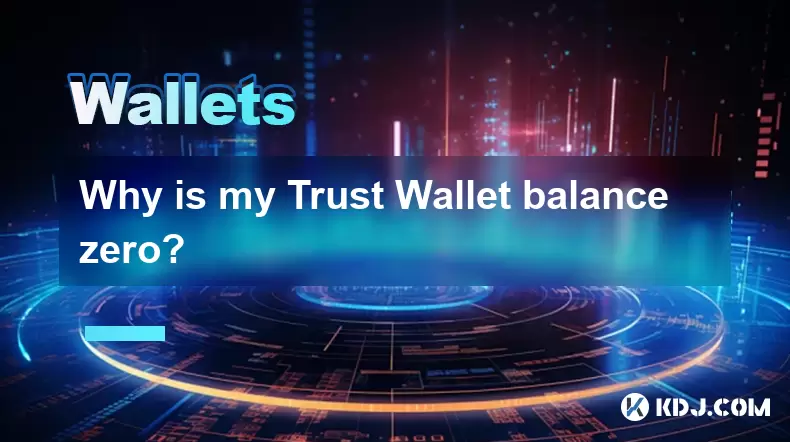
Why is my Trust Wallet balance zero?
Aug 02,2025 at 03:49am
Understanding Trust Wallet Balance Display IssuesIf you're seeing a zero balance in your Trust Wallet despite knowing you've previously received or se...
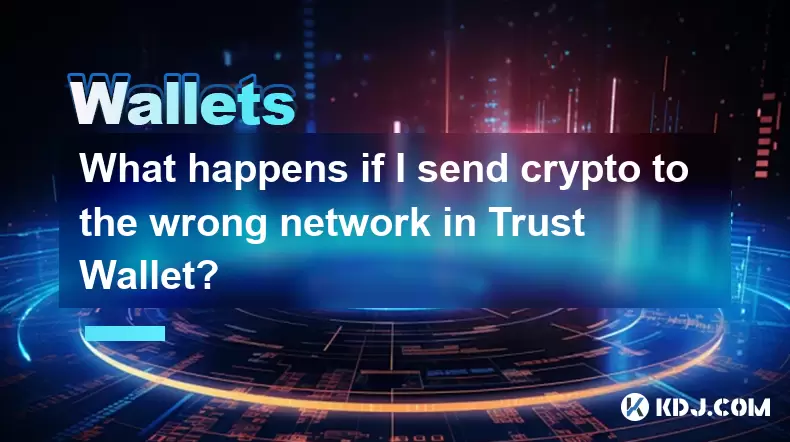
What happens if I send crypto to the wrong network in Trust Wallet?
Aug 02,2025 at 07:22pm
Understanding Network Compatibility in Trust WalletWhen using Trust Wallet, it's essential to understand that different cryptocurrencies operate on di...
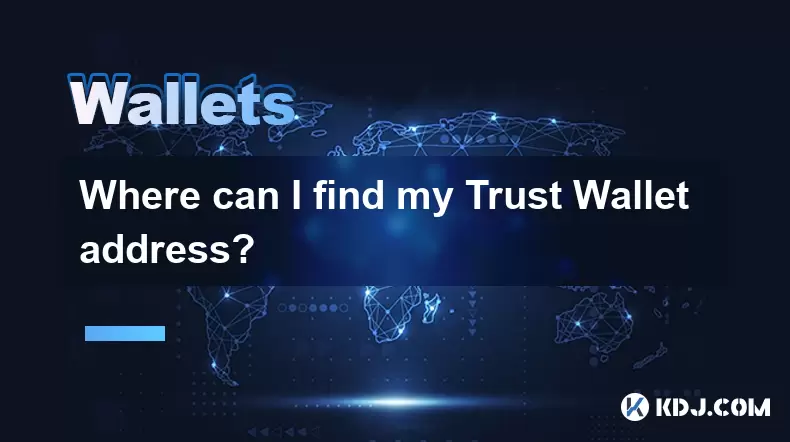
Where can I find my Trust Wallet address?
Aug 02,2025 at 06:07pm
Understanding Your Trust Wallet AddressYour Trust Wallet address is a unique identifier that allows others to send you cryptocurrency. It is a string ...

What is a watch-only wallet in Trust Wallet?
Aug 02,2025 at 03:36am
Understanding the Concept of a Watch-Only WalletA watch-only wallet in Trust Wallet allows users to monitor a cryptocurrency address without having ac...

How to switch between networks in Trust Wallet?
Aug 02,2025 at 12:36pm
Understanding Network Switching in Trust WalletSwitching between networks in Trust Wallet allows users to manage assets across different blockchains s...

How to check my full transaction history on Trust Wallet?
Aug 02,2025 at 09:24am
Understanding Transaction History in Trust WalletTrust Wallet is a widely used non-custodial cryptocurrency wallet that supports a broad range of bloc...

Why is my Trust Wallet balance zero?
Aug 02,2025 at 03:49am
Understanding Trust Wallet Balance Display IssuesIf you're seeing a zero balance in your Trust Wallet despite knowing you've previously received or se...

What happens if I send crypto to the wrong network in Trust Wallet?
Aug 02,2025 at 07:22pm
Understanding Network Compatibility in Trust WalletWhen using Trust Wallet, it's essential to understand that different cryptocurrencies operate on di...

Where can I find my Trust Wallet address?
Aug 02,2025 at 06:07pm
Understanding Your Trust Wallet AddressYour Trust Wallet address is a unique identifier that allows others to send you cryptocurrency. It is a string ...
See all articles

























































































